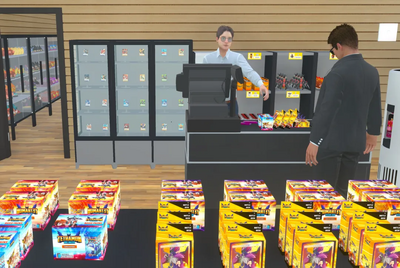Quick facts:Trading
Trading is a core gameplay feature in TCG Card Shop Simulator that allows players to exchange cards with customers or NPCs. It is unlocked at Level 10 and serves as a vital tool for expanding inventory, completing collections, and acquiring rare or valuable cards.
Overview[edit | edit source]
Trading is an interactive mechanic where players negotiate card exchanges with in-game customers or NPCs. The value of trades is determined by card rarity, current market trends, and the demand for specific cards. Players must evaluate trade offers carefully to ensure they gain valuable assets or fill gaps in their collections.
How Trading Works[edit | edit source]
Once unlocked, the Trading feature becomes available in the shop. Players can:
- Initiate Trades: Customers or NPCs may approach with trade offers, or players can suggest trades.
- Assess Card Values: Each card is evaluated based on its rarity, element, and market demand.
- Accept or Counter Offers: Players can agree to proposed trades or counter with their own terms.
Trades are limited to cards currently in the player's inventory and those offered by customers or NPCs.
Benefits[edit | edit source]
Trading offers several advantages:
- Expand Inventory: Acquire new cards that can enhance decks or complete collections.
- Complete Sets: Fill missing gaps in card collections to achieve set bonuses or milestones.
- Improve Card Rarity: Exchange lower-rarity cards for higher-value Legendary or Epic cards.
- Build Synergy: Focus on cards that align with specific deck strategies or elements.
Tips for Effective Trading[edit | edit source]
- Track Market Trends: Pay attention to card demand and rarity trends to maximize trade value.
- Prioritize Collections: Focus on completing sets or acquiring key cards for synergy.
- Avoid Overpaying: Evaluate offers carefully to ensure fair exchanges.
- Leverage Unused Cards: Trade duplicates or unused cards for ones that fit better in your decks.
Challenges[edit | edit source]
- Uneven Offers: Some customers may offer trades that heavily favor their side, requiring negotiation.
- Market Fluctuations: Card values may shift, affecting trade outcomes.
- Inventory Limits: Trades are restricted to cards currently in the player's collection.
